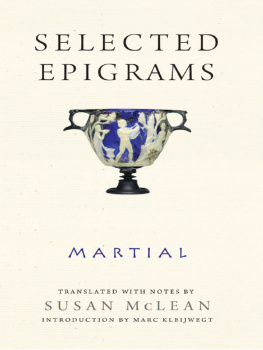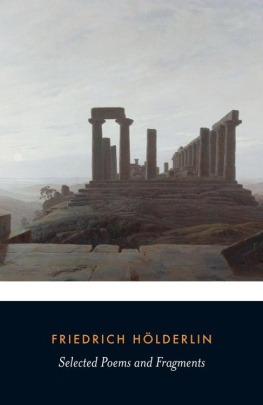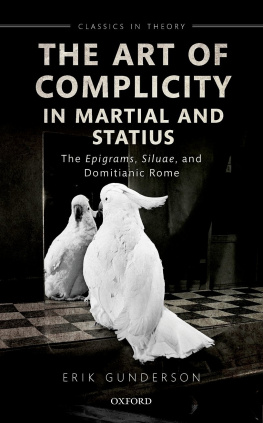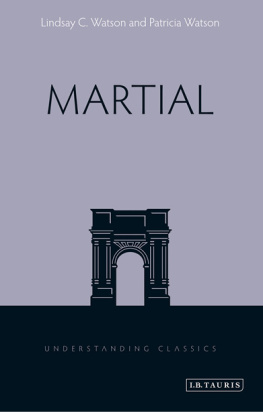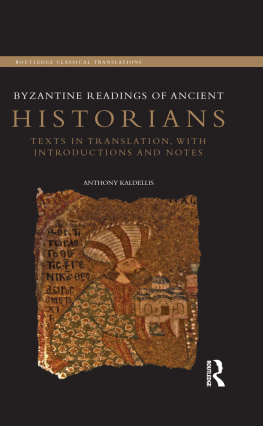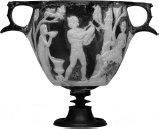Selected Epigrams
MARTIAL
Translated with notes by
Susan McLean
The University of Wisconsin Press
The University of Wisconsin Press
1930 Monroe Street, 3rd Floor
Madison, Wisconsin 53711-2059
uwpress.wisc.edu
3 Henrietta Street, Covent Garden
London WC2E 8LU, United Kingdom
eurospanbookstore.com
Copyright 2014
The Board of Regents of the University of Wisconsin System
All rights reserved. Except in the case of brief quotations embedded in critical articles and reviews, no part of this publication may be reproduced, stored in a retrieval system, transmitted in any format or by any meansdigital, electronic, mechanical, photocopying, recording, or otherwiseor conveyed via the Internet or a website without written permission of the University of Wisconsin Press. Rights inquiries should be directed to
Printed in the United States of America
Library of Congress Cataloging-in-Publication Data
Martial, author.
[Epigrammata. Selections. English]
Selected epigrams / Martial; translated with notes by Susan McLean.
pages cm (Wisconsin studies in classics)
Includes bibliographical references and index.
ISBN 978-0-299-30174-3 (pbk.: alk. paper)
ISBN 978-0-299-30173-6 (e-book)
1. MartialTranslations into English.
2. Epigrams, LatinTranslations into English.
I. McLean, Susan, 1953, translator. II. Title.
III. Series: Wisconsin studies in classics.
PA6502.M37 2014
878.0102dc23
2014007450
Publication of this volume has been made possible, in part, through the generous support and enduring vision of Warren G. Moon.
Contents
Preface
Who was Martial? He was a talented poet with a particular genius for humor, wit, and satire. He was also an outsider of modest means from a distant province in what is now Spain. He came to Rome as a young man hoping to earn a living from writing, which could be done only by finding wealthy patrons. The contradictions between his skills and his goals were many. Readers enjoyed satiric and humorous verse, but ranked it very low among forms of literature. Satire was also dangerous. Satiric poets ran the risk of alienating patrons if the patrons suspected that they were butts of the satire. Although the emperor was the most desirable patron of all, since he could provide the greatest rewards, prominent writers such as Seneca, Petronius, and Lucan had been forced to commit suicide when they had angered their ruling emperor, Nero.
Martials response to these challenges was pragmatic. To the dangerous emperor Domitian, he offered poems of hyperbolic flattery. Martial seems to have been largely disappointed in his hopes of generous reward from Domitian. Although he did survive that rulers fifteen-year-long reign, he later found that his praise of Domitian did not ingratiate him with subsequent emperors. He also flattered a large number of lesser patrons, writing poems in praise of them and often addressing them in poems as friends who would concur with his satirical gibes at others. Unlike Catullus, whose satirical epigrams Martial admired, Martial publicly insisted that his satire was not directed at real individuals. Other than patrons, real people named in his satirical poems were already safely dead. From his patrons Martial received enough income to qualify for the privileges of a knight and to support his taste for good wine, good food, and attractive slave boys. He did not, however, achieve the kind of financial independence that would free him from the onerous duties of paying morning calls on patrons (as he often complained) until he finally retired to his hometown in Spain near the end of his life.
To write effective satirical epigrams, a writer needs a keen sense of the ridiculous, incisive wit, and trenchant punch lines. In addition to these skills, Martial had insight into the quirks of human behavior, and a delight in bawdy humor. Since many of Martials poems are putdowns of one kind or another, one might assume that he had a malicious or sour personality. But the poems themselves provide contrary evidence. His tender epitaphs for child slaves, such as Erotion (5.34) and Pantagathus (6.52), his poems in praise of balance and moderation in life (5.20; 10.47), and his poems that poke fun at himself (6.82; 10.9) all reveal a man who combined wit with feeling and who was as ready to laugh at himself as at others.
As Freud points out in Jokes and Their Relation to the Unconscious, humor often has a sexual or aggressive element in it (97). Because these impulses must normally be repressed in social interactions, humor provides pleasure, both for the person telling the joke and for those laughing at it, by enabling the impulse to be expressed despite the social taboos against it (100 101) and by providing temporary relief from the psychic energy used to maintain the repression (118). Freud notes that innocent jokes, which lack this element of violating taboos, seldom cause a burst of laughter (96). Martial, when satirizing an unnamed writer of bland and innocuous epigrams (7.25) or an epigrammatist whose language and subjects are always chaste (3.69), implies that such approaches just arent entertaining. His use of generic names for the targets of his satire allows Martial to make jokes about even the rich and powerful, because he can do so without making his emperor or patrons think that he is attacking them. In a joke about a generic target, no individual gets hurt. Martial is thus able both to enjoy rebellion against authority figures and, by satirizing those who violate the standards of acceptable behavior in society, to align himself with those in power, using embarrassment as a tool to maintain social codes.
It is difficult to winnow a clear notion of Martials personality from the many stances he adopts for the sake of his jokes and satires. He visited and dined with the wealthy and powerful, but his dependent status meant he was not treated as one of them. He often jokes about his poverty, his mean apartment, his meager farm in Nomentum, and his threadbare toga, yet some of his complaints may have been intended as hints to patrons that more support was needed. He appears to be proud of his fame, irritated by plagiarists who try to claim his wit and skill for themselves, and unwilling to accept the general assessment that epigrams were a lesser form of literature than the odes, epics, and tragedies that people of his time valued more. Any dissatisfactions he had with his patrons had to be expressed as jokes and directed at pseudonymous targets in a way that wouldnt anger the actual patrons. Yet despite Martials need to be circumspect in his writing, Pliny the Younger, who knew him, states in one of his published letters (3.21) that Martial had no less candor than wit and acerbity (236; my translation). Undoubtedly Martial was as complex and contradictory as most people, yet I have found in translating his poems that he comes across as a man with an irrepressible gusto for life and a fascination with human behavior in all its forms.
T his translation of about a third of the Latin epigrams of Martial is meant to provide a wide cross section of Martials satirical themes, subjects, and humorous and poetic techniques, in contemporary, colloquial language, for an audience of college students and general readers. The poems are translated into rhymed, metrical verse in an attempt to capture the poetic polish of the originals. I selected these epigrams to convey a vivid and varied portrait of Roman life in the first century CE, to show the range of Martials tones and subjects, and to showcase his satirical wit and often racy humor. I tended to favor the shorter, funnier, and more accessible epigrams over longer ones (in which the final point often does not seem to be worth the long setup), those that are overfull of allusions to classical myth or history, those that are mainly intended to flatter patrons, those that depend on untranslatable puns, or those whose humor would not come across to contemporary readers. Some of Martials humor depends on obscenity, which has often been avoided or minimized in past translations, and I have tried not to downplay that element, but have provided notes to explain jokes and attitudes that may seem puzzling to readers unfamiliar with Roman culture. Humor varies over time and between cultures; I have not tried to impose current standards of sensitivity on poems whose humor often may seem racist, sexist, offensive in its treatment of gay men, lesbians, and people with physical disabilities, or callous about violence toward and sexual abuse of slaves.

